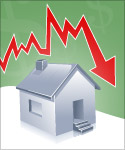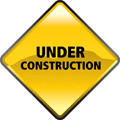 Real estate has been regarded as one of the safest investments for quite some time. However, despite the relative safety of real estate investments, there is always the possibility that the real estate market can fall just like any other investment.
Real estate has been regarded as one of the safest investments for quite some time. However, despite the relative safety of real estate investments, there is always the possibility that the real estate market can fall just like any other investment.
Over the long term, real estate remains relatively safe simply due to the fact that the population of the world continues to increase while land is a limited resource. When there is an occasional downturn in the real estate market, it is important to recognize certain strategies which can be used in order to keep a real estate investment from becoming a complete loss.
The first thought many people have when they realize the market has turned down is to attempt to sell the property as quickly as possible before the market gets worse. In reality, most investors have found that it is often better if they can hold onto the property and ride out the market downturn. While it is possible the market might dip lower before it rebounds, historically real estate markets always come back.
Of course, holding a property during a downturn assumes that you are financially capable of supporting the carrying costs involved (mortgage, utilities, property taxes, and maintenance). Many investors have positive cash-flows on their properties and have nothing to be concerned about. But if you have a negative cash flow, you will need to budget those monthly costs for as long as you keep the property.
In addition, many investors find they are not taking advantage of all the tax benefits available to them. Consulting a professional tax advisor in order to identify legitimate tax advantages you may have missed would certainly be worth it financially. You may find that the write-offs available to you could provide the assistance you need to hold onto the property until the market swings back around, particularly if you are experiencing a negative cash flow.
If you find that you are facing a foreclosure on the property, then the best option would obviously be to go ahead and sell it as soon as possible in order to attain as much profit as possible rather than take a complete loss. In this type of drastic situation, the key is to look for ways that you can make the property as valuable as possible. This can be from minor upgrades (carpet, paint, lights) or providing special terms (seller concessions, second mortgage, etc.).
Selling real estate is really not much different than selling any other type of product. If you have had the property on the market for awhile without any interest, it is important to look at why it has been difficult to sell the property. Consider lowering the price or making some changes in order to make it more desirable.
Ultimately, holding out during a market crash or downturn involves remaining calm and avoiding action based on emotional impulses. Making hasty decisions based on fear will often cause you to take actions you are likely to regret once the market turns back around. Before you take any action, make sure you have carefully considered all of the options available to you. By doing so, you may well be able to turn a dip in the market into a large return once the market turns and climb back up.



